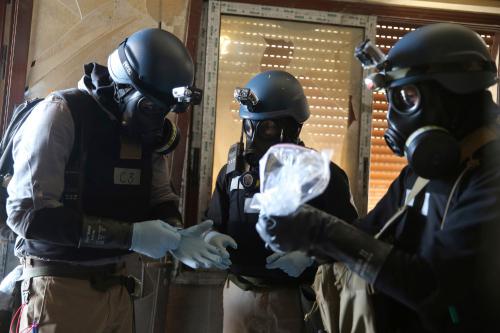Phuket Gazette World News: Syria submits new 100-day plan for removal of chemical weapons

PHUKET MEDIA WATCH
– World news selected by Gazette editors for Phuket’s international communitySyria submits new 100-day plan for removal of chemical weapons
Phuket Gazette / Reuters
PHUKET: Syria has submitted a new 100-day plan for the removal of its chemical weapons after failing to meet a February 5 deadline, but the international mission overseeing the operation believes it can be done in a shorter time frame, diplomats said on Friday.The Organization for the Prohibition of Chemical Weapons executive committee met on Friday in The Hague to discuss the joint OPCW and U.N. mission amid growing international frustration at Syria falling behind on its commitments.
Syria failed to meet an OPCW deadline of February 5 to move all of its declared chemical substances and precursors out of the country. The final deadline under the OPCW plan is for all of Syria’s declared chemical materials to be destroyed by June 30.
“The Syrian 100 day plan for removal of the chemicals, on which we have been briefed, is not adequate,” Philip Hall, head of the British Foreign Office Counter Proliferation Department, told the OPCW, according to a copy of statement.
“We now urge the Syrian authorities to accept the proposals submitted by the Operational Planning Group that provide for removal in a much shorter time frame, without compromising on security,” he said.
A senior U.N. diplomat, speaking on condition of anonymity, said the international mission believes the operation can be carried out before the end of March, adding that Syria’s proposed end-May deadline would not leave enough time for the chemicals to be destroyed before the end of June.
The OPCW declined to comment on Syria’s proposal.
The United States has sent the MV Cape Ray, a ship outfitted with special equipment to neutralize the worst of Syria’s chemicals at sea, and says it will need 90 days to complete the destruction.
Syrian President Bashar al-Assad agreed to destroy his chemical weapons following global outrage over a sarin gas attack in August, the world’s deadliest chemical attack in 25 years. That attack sparked a U.S. threat of military strikes, which was averted by Assad’s pledge to give up chemical arms.
U.N. disarmament chief Angela Kane said on Thursday in New York that any new plan would need to be endorsed by the OPCW and the U.N. Security Council.
The deal for Syria to give up its chemical weapons, brokered by the United States and Russia, was enshrined in a U.N. Security Council resolution in September.
The resolution does not allow for automatic punitive action in the form of military strikes or sanctions if Syria does not comply. At Russia’s insistence, the resolution makes clear a second council decision would be needed for that.
Russia has made clear, however, it would not support the use of force against Assad’s government, a close ally.
So far Syria has relinquished only 11 percent of its declared 1,300 tonnes of chemical weapons, sources told Reuters last week. The worst chemicals, of which only 5 percent have been removed, are supposed to be destroyed by the end of March and the rest of the toxins by the end of June.
Sigrid Kaag, head of the international mission, said earlier this month that she did not believe the Syrian government was intentionally delaying the removal of its arsenal, but that accelerated cooperation was vital to meet the mid-year deadline.
“Intermediate milestones ideally should have been met, they have not been met, there are delays,” she said. “Delays are not insurmountable. Delays have a reason, there’s a rationale, there’s a context.”
U.N. Secretary-General Ban Ki-moon said in a report last month that Syria has enough equipment to transfer the chemicals out of the country. Syria has blamed the delays on security concerns, a lack of equipment and the weather.
— Phuket Gazette Editors
Latest Thailand News
Follow The Thaiger on Google News:
























